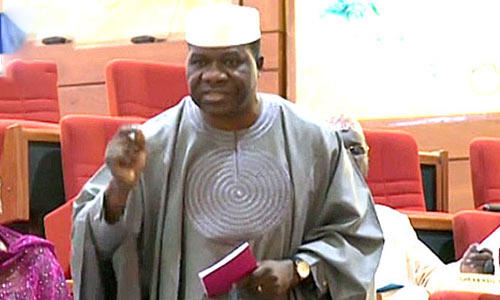An old idea to explain away corruption was brought up in the National Assembly earlier this month: that corrupt civil servants, in this case, judges and justices, are corrupt because they are poorly paid.
Senator Opeyemi Bamidele made this comment in his opening remarks at Senate hearings for the elevation of eight Court of Appeal justices to the Supreme Court on October 7. He noted that the monthly take-home pay of the justices of the Supreme Court, Court of Appeal and High Court respectively is N753,000, N608,000 and N556,000 and lamented that this “poor” remuneration is exposing Nigerian judges and justices to temptation.
- We’re Owing Road Contractors N392bn – FG
- How Road Construction Is Boosting Economic Activities In North East
This is not the first time Senator Bamidele, who chairs the Senate Committee on the Judiciary, Human Rights and Legal Matters, has made this argument. In November last year, he called on Nigerians to “rescue” the corrupt judiciary with “adequate funding”. But he is not the only one: a few months earlier, Rep. Gudaji Kazaure moved a motion in the House of Representatives, for better pay for judges arguing that their counterparts in the United Kingdom aren’t corrupt because their emoluments are about ten times more. He concluded that we shouldn’t complain of corruption in the judiciary, because their salary is too meagre to sustain and educate their families.
There is no doubt that not only judges but also their support staff, who deal directly with litigants and whose pay is much worse, need better employment conditions. But we need to eradicate the idea that the cause of corruption is poor pay. This thinking is as dangerous as it is insulting. It excuses bribery not only in the judiciary, but also in other sectors, most of whose workers are much more poorly remunerated than judges.
By this logic, every civil servant can effortlessly rationalise fraud; teachers can extort their students and sell grades; police officers can collect bribes on the road and act as a private security force; revenue collectors can issue fake receipts in exchange for bribes because they are poorly paid. It can even be extended to those not working for the government: traders can adulterate their products or give short measures because they don’t make enough profit to feed and educate their families. In fact, we can take this perverse concept even further: armed robbers can be excused because they can’t make enough money in legal enterprises or didn’t have a job. It’s a bottomless pit.
I spent five years dealing with judges and court officials day-in, day-out. I know how terribly corrupt the judiciary is. But the judges and court staff that are corrupt aren’t crooked because they are destitute as Bamidele and Kazaure would have us believe. They are dishonest because of pure greed, lack of integrity and poor character. There is a simple proof for this. If corruption is inevitable for ‘poorly paid’ judges, why are only some of them corrupt? Why are some judges and civil servants beacons of integrity, bringing shame upon their crooked colleagues?
Only sheer strength of character, combined with law enforcement, can prevent civil servants from untoward behaviour in the line of duty. Character is the most important quality of a judge: much more than education, intelligence or judicial temperament, as crucial as those characteristics are. Anyone lacking the strength of character to resist the temptation of corruption regardless of their circumstances has no business becoming a judge. Any judge or civil servant who feels they can’t live on their legal earnings should resign and find a more lucrative job.
One of the arguments advanced in favour of police pay rise during President Yar’adua’s administration was that it would reduce bribe-taking by police officers. Police salaries more than doubled, but we still see the effects of police corruption daily. Interestingly, a similar experiment proved counter-productive in Ghana. In 2010, the country doubled its police officers’ salary to reduce petty corruption on its roads. A study found that, instead of decreasing, the total amount of illegal earnings through bribery increased. But why are we surprised? Greedy individuals will always be greedy. The more you give them, the more they ask for more. They are insatiable.
There is another example right at home. Last year, the Code of Conduct Tribunal convicted the former Chief Justice of Nigeria (CJN), Walter Onnoghen for failure to disclose hundreds of thousands of dollars, euros and pounds in five different domiciliary accounts he had, removed him from office and ordered that he forfeits the sums stashed in those accounts as they were presumably illegally obtained. Onnoghen was a justice of the Supreme Court of Nigeria for years before going on to become the CJN. He was the highest-paid judicial officer in Nigeria. He had multi-million-naira houses across Nigeria, had millions in savings and his pension was enough to sustain him and his family for the rest of his life. But all this didn’t slake his greed for more.
Even our university students engage in petty corruption: how many readers of this paper will know people who took scholarship allowances from multiple states, claiming to be from each of them? They may claim that this is legitimate because they are poor: but those who are dishonest on a small scale when they are poor will be dishonest on a grand scale when they are rich.
Anyone who collects multiple scholarships will collect multiple salaries in the civil service through ghost workers and, given the opportunity, they will steal from the public coffers. By the same token, any judge that takes bribes when they earn N500,000 will take bribe if they were paid five million naira. But they may demand fatter bribes. The Bible was spot on when it said in Luke 16:10 “Whoever is faithful in little will be faithful also in much; and whoever is dishonest in little is also dishonest in much.”
The bottom line is salary increases for judges, and indeed all civil servants, is a worthy call. But using poor pay to justify or diminish the gravity of corruption is disingenuous. Corruption is a legal offence and a moral wrong – period. No ifs. No buts. No equivocation. Parents have got to raise their children on this. Teachers, imams and pastors must be clear on this and leaders must stop seeking to rationalise corruption under any guise.

 Join Daily Trust WhatsApp Community For Quick Access To News and Happenings Around You.
Join Daily Trust WhatsApp Community For Quick Access To News and Happenings Around You.


